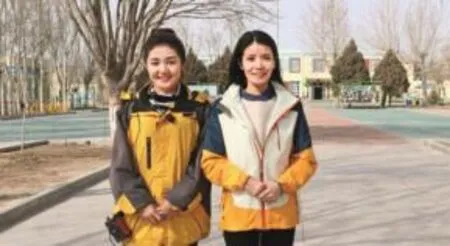SPEAKING VOLUMES
By Wang Fengjuan
Bilingual education means more opportunities
Walking into No. 14 Village Kindergarten of Naizerbagh Town in Kashgar, Xinjiang Uygur Autonomous Region, we reporters were greeted with a children's song that goes, “I'm a Chinese kid with black eyes and black hair, and I speak Chinese. China is my home wherever I go.”
Kindergarten principal Kaidiraya led us into a classroom for four-year-olds. About 20 kids in red sportswear accompanied their singing with a simple dance and bright smiles.
When the kids saw us in their classroom or on the playground, they smiled and warmly greeted us in Mandarin Chinese.
Growing Up Together
“On an area of 2,780 square meters, the kindergarten's 27 teachers serve 266 children in nine classes,” outlined Chen Wenlu, a graduate of Xinjiang Normal University who now serves as Party secretary of the kindergarten. She also oversees another 18 kindergartens in Naizerbagh Town. According to Chen, more than 7,000 kids in the town are now receiving pre-school education,nearly 100 percent of the children in the age range.
“Due to conceptual changes, more and more parents have started to support bilingual education in the kindergarten as they start desiring to improve their own proficiency in Mandarin,” remarked Chen.“Without language barriers, their children will have more opportunities for career development.”
In their first two weeks in the kindergarten,the kids are usually taught a set of rules for polite behavior and good manners. After half a year of learning, most can speak both Mandarin and their native language in daily conversations as well as use either language to tell stories. “Compared to their first days here, these kids have made great progress in Mandarin, and they have also become more outgoing,” added Chen.
A millennial from Nanjing, capital of eastern China's Jiangsu Province, Chen has remained dedicated to pre-school education in Kashgar since graduating from college. From teacher to Party branch secretary responsible for the well-being of 19 kindergartens in the town, she has matured alongside the children over the past seven years.Chen's youthful face nearly always features a radiant smile. “I decided to stay in Xinjiang after graduation primarily because of my boyfriend,” Chen admitted.“But what drove my devotion to the work was a teacher's sense of mission and responsibility. I look forward to working with my colleagues to contribute to the development of early childhood education in southern Xinjiang.”
In a classroom for three-year-olds, the sun pierced the windows to warm a teacher and a group of kids as well as plum branches in a vase. The children sat around a table as the teacher instructed them on how to make a plum flower out of clay.
“Look, my flower is done,” one kid said, holding up a small red flower. The teacher smiled and exclaimed,“It's beautiful! Now you can put it on the branch.”
“I enjoy working here with these lovely kids,”revealed Kaidiraya. “Through our efforts, they will learn new things and make progress every day.”According to the principal, 90 percent of teachers in the kindergarten are young people from the rest of China between the ages of 24 and 30 who are devoting their youth and passion to children.
More Opportunities
“Who can tell me where this picture was taken?”asked a teacher to a class of five-year-olds in Mandarin and then their ethnic language, pointing to a screen. “Tiananmen in Beijing,” all kids answered in unison.

Chen Wenlu(right), Party secretary of the No. 14 Village Kindergarten, and the kindergarten principal Kaidiraya.

Kids perform a children's song.

A teacher instructs a group of children on making crafts.
“We have seen from our experience that bilingual education helps improve the overall quality of the children,” Kaidiraya explained. “It offers the kids an opportunity to learn the most commonly used language in the country and helps standardize the use of their ethnic language, which better prepares the kids for the mainstream society when they grow up.” She added that many parents have realized that their children will benefit tremendously from future proficiency in multiple languages.
To further promote bilingual teaching in preschool education, teams of volunteer teachers have been selected and dispatched to work in southern Xinjiang regions such as Hotan Prefecture, Kashgar Prefecture, Aksu Prefecture and Kizilsu Kirghiz Autonomous Prefecture. At the same time, heads of kindergartens and primary and secondary schools across Xinjiang have been selected for temporary posts in educational institutions at upper or lower levels in the region.
“Instead of saying we ‘should' learn Mandarin,I think today we ‘must' learn Mandarin,” declared local villager Memeti Awuti. “Learning Mandarin not only helps improve our abilities, but also contributes to ethnic solidarity. We are Chinese, and we must learn the most commonly used language in our country.” He also described that in the past,many children in the village who couldn't speak Mandarin found difficulties finding a job after dropping out of school, which made them become more drawn to extremism.
“I'm determined to become a teacher after graduation, because I want more children in Xinjiang to receive a good education,” pledged Tangnur Akhon, an undergraduate student at Kashgar University. When he was a child, only a few kindergartens offered Mandarin courses, so his father had to take him to a school three kilometers from home. Bilingual education has now become popular in Xinjiang. It is necessary for local children to learn both Mandarin and their native language so that they can serve as ambassadors of their respective ethnic groups and help enhance mutual understanding and trust, he added.
In addition to educational institutions, Mandarin training is also available in many communities in Xinjiang for parents and residents. Guli Abuliz is the mother of two and glad to see her kids making progress in Mandarin. “I'm learning Mandarin as well,” she revealed. “I hope my kids seize a better life when they grow up and find more opportunities through speaking Mandarin.”

